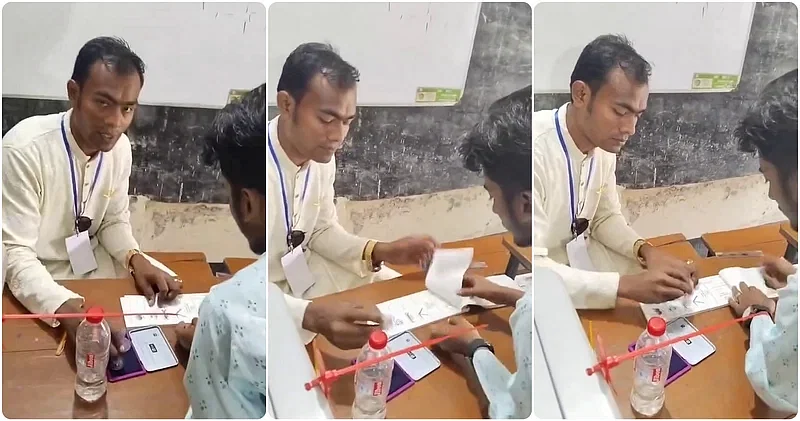Background: Legacy of Farcical Elections
On 5th November, 2023, in the by-elections in the Laxmipur-3 and Brahmanbaria-2 constituencies,
amidst widespread national and international appeals for free, fair, and participatory elections in
Bangladesh, the ruling Awami League (AL) – along with its loyal state apparatus – has orchestrated
yet another farce in the name of holding elections. This reveals the hollowness of their frequently
repeated promises to conduct the upcoming national election impartially. If the Sheikh Hasina regime
cannot show minimal impartiality in overseeing a simple by-poll, questions are bound to arise about
their commitment to maintain fairness during the impending high-stakes national election.
The deeply flawed 2014 and 2018 national elections have not only eroded the integrity of the
Bangladeshi state across all its facets, but have also cast a lasting shadow on the country’s
international reputation (1). As the by-polls in Lakshmipur-3 and Brahmanbaria-2 serve as a blueprint
for the 2024 elections, Bangladesh stands on the precipice of an existential threat – one that
endangers the foundational principles of the state and puts at risk the fate of its 180 million people.
Rigged By-Elections: Heads-Up for the Worse in 2024
In both the by-elections, the AL activists engaged in extensive vote-rigging, continuing their
longstanding pattern of manipulating elections with the aid of state resources. The events were
tainted by numerous irregularities, such as the expulsion of agents representing opposition candidates
from polling stations, open voting and the stuffing of ballot boxes.
Just about two months before the upcoming parliamentary election, the by-elections were tainted by
the expulsion of agents representing opposition candidates from polling stations, as well as blatant
cases of flawed voter lists, people flooding the votes for AL, and fake votes being cast (2).
The world witnessed a new record in election fraudulence when a polling agent from the AL
managed to stamp 43 ballots over a mere 57 seconds, equivalent to an astonishing 45 ballots per
minute. The video of the incident has swiftly gone viral on social media. Candidates from all parties
barring the ruling AL, boycotted the by-polls, citing allegations of vote-rigging, though the AL
consistently disregard these concerns.
Once again, the citizens, the civil society, and the media of Bangladesh were left in complete
astonishment and frustration due to the repeated occurrence of obvious fraudulent activities in almost
every election under the Hasina regime. As noteworthy as such rigging was the manner how it was
captured: in a video taken so that it would be shown to AL officials, to provide the bona fides to be in
line for the post-election allocation of patronage and perks.
As is customary, AL leaders orchestrated a theatrical display in the guise of an election, making a
mockery of democratic processes, with the aid of the administration and the police. What made this
by-election remarkably unexpected was that it took place after the parliament had already been
dissolved. That is, the member of the parliament elected here won’t even have the opportunity to
participate in a parliamentary session.
It is important to note that candidates from the Bangladesh Nationalist Party (BNP) or any other pro-democracy opposition party did not participate in these elections. Therefore, the mechanisms of vote
rigging were practiced against the candidates from Jatiya Party, the ruling AL’s electoral ally, which
in turn, underscores the fact that holding a fair and credible election under the Hasina regime,
regardless of the circumstances or competitors, remains unanimously untenable.
The performance of both the Election Commission and of the government officials responsible for
overseeing these elections has been equally exasperating. The returning officer for the Lakshmipur
by-polls initially refuted all allegations of electoral fraud. It was only after the 57-second video went
viral that he issued a letter to investigate the alleged irregularities. Likewise, the returning officer for
the Brahmanbaria by-poll adamantly denied any irregularities, despite clear evidence of the contrary.
These by-elections clearly demonstrated why any elections under the Sheikh Hasina government
would not be free and fair, and how it is not possible for opposition parties to participate in such
farcical endeavors.
Rigged Elections as the Last Resort: AL’s High Stakes
One would have assumed that it would be in the best interest of the Hasina government to have held
free and fair by-elections here, to burnish her claim of being able to hold elections that are acceptable
domestically and internationally. However, such an assumption runs afoul of the four cardinal rules
that govern the present-day Bangladesh:
(1) Weighed down by 15 years of extensive misrule, widespread oppression, and galloping
inflation, Awami League understands that it is not in a position to win fair elections, in
almost every constituency in Bangladesh, for any position, without resorting to
significant rigging and manipulation in voting.
(2) There is simply too much money, power, and resource at stake for local AL leaders and
activists to let even a single national, district, or local government position to be won by
another political party.
(3) The AL party men at all levels live in fear that their corrupt practices, atrocities, and
illegal activities might catch up with them. They are concerned that an impartial
administration and fair judiciary might pose a threat, prompting them to anyhow hold
onto electoral positions to evade accountability and preserve control
(4) Government officials across the law enforcement agencies, judiciary, administration, and
election commission, who assist the AL in illegal activities face no repercussions; in fact,
they are often rewarded with financial incentives or facilities for their support. Penalties
such as disciplinary measures, demotion, or termination are only enforced against
officials who are deemed insufficiently supportive of the Awami League members.
It is clear that any election in Bangladesh, as long as Sheikh Hasina retains power, will inevitably
witness extensive rigging in favor of the AL. Even in the hypothetical scenario where Hasina calls
for a free and fair election, local AL units will have no choice but to engage in widespread rigging to
secure their victory. This is because failing to do so would result in their significant loss of income
and influence, ultimately leading to the collapse of their patronage network and power structure, a
course of action they are not prepared to accept.
The Way Forward: Election-Time Neutral Government
The world witnessed Hasina regime’s North Korean style elections in 2014 and 2018 (3), and rightfully
called for probe into election irregularities and violence (4). The recent by-elections in Lakshmipur-3
and Brahmanbaria-2 exemplify what should be expected in the 2024 elections if Sheikh Hasina
continues to cling to power. This situation underscores the lack of change and a worsening state of
affairs, with the authoritarian regime becoming increasingly violent and repressive.
Thankfully, Bangladesh possesses a longstanding tradition that promotes free, fair, and inclusive
elections: the establishment of an election-time neutral government, disinterested in the election’s
outcome. Emotionally and logically, such governments symbolize a vital shift, signaling a change in
the existing power dynamics.
In this context, Sheikh Hasina’s much-anticipated resignation, marking the end of an oppressive
regime, and a shift in government leadership for holding the elections, would have a profound
impact. It would fundamentally transform the political landscape, instilling trust in the fairness of
elections, and crucial for reinstating democracy and upholding voting rights in Bangladesh.
We gratefully appreciate the public support and diplomatic engagement of the democratic nations
and institutions, aimed at reinstating democracy and voting rights in Bangladesh. To witness a
genuinely free, fair, and participatory election in the country, the implementation of an election-time
neutral government is the only realistic and viable option. The outspoken and thoughtful
endorsement towards this step – from the international friends of Bangladesh – can make a huge
difference to the prospects of a democratic Bangladesh.
(1) https://www.thedailystar.net/opinion/views/news/the-model-the-2024-national-election-3464481
(2) https://www.tbsnews.net/bangladesh/bbaria-2-polls-independent-candidate-alleges-rigging-733578
(3) https://www.washingtonpost.com/world/2018/12/31/why-bangladeshs-landslide-election-result-is-bad-its-democracy/
(4) https://www.reuters.com/article/us-bangladesh-election-idUSKCN1OV1PK


